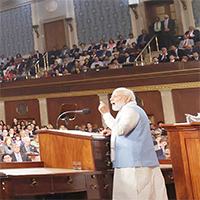PM Modi’s historic state visit heralds a new era in Indo-US relations
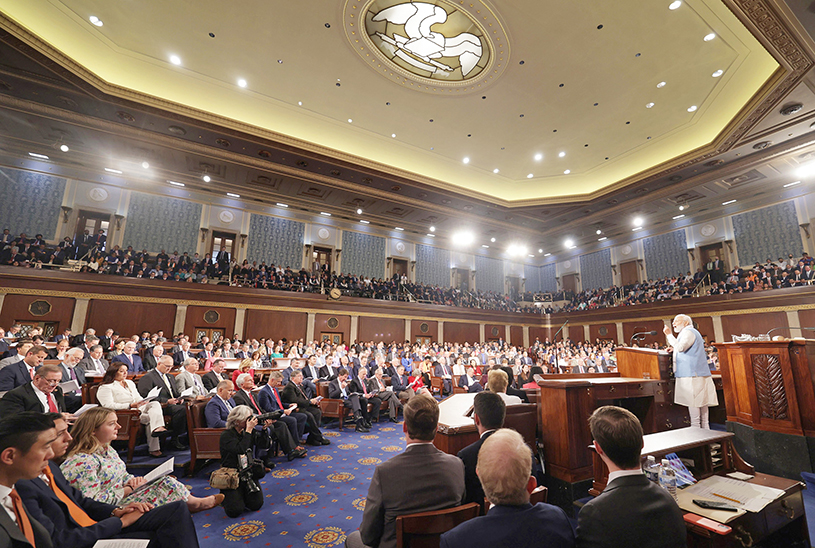
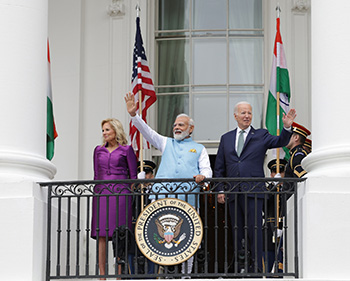
PM at White House Arrival Ceremony, in Washington, D.C. on June 22, 2023.
Indian Prime Minister Narendra Modi and U.S. President Joe Biden celebrated a new phase in the India-U.S. relationship during Mr. Modi’s visit to the White House. The event, which took place on a rainy Thursday morning, involved a ceremonial welcome for Mr. Modi by President Biden and First Lady Jill Biden on the South Lawn. Cabinet officials from both countries and several thousand members of the Indian diaspora, some of whom chanted “Modi, Modi,” were in attendance. Beyond the pomp and ceremony, the leaders announced a wide range of collaborations in defense, technology, health, energy, and mobility. President Biden referred to this as a “next generation partnership” between the two nations.
In his speech, Prime Minister Modi expressed gratitude for the Indian-American community’s large representation and the unprecedented opening of the White House doors to them. Chants of “Modi, Modi” and “Vande mataram” filled the air before his arrival, with some attendees also shouting “USA, USA” during the ceremony. However, concerns about Mr. Modi’s past as Chief Minister of Gujarat and the state of democracy in India were also evident in Washington. Over 70 lawmakers had written to President Biden, urging him to address democratic norms and human rights during discussions with Mr. Modi. A few lawmakers even announced their decision to boycott Mr. Modi’s address to the U.S. Congress. Former President Barack Obama, a close friend of President Biden, also appealed to Mr. Modi to protect ethnic minorities in India.
Both leaders emphasized the shared democratic values of India and the United States, with President Biden highlighting principles such as equity under the law, freedom of expression, religious pluralism, and diversity. They also referenced their respective constitutions, which both begin with the phrase “We the people.” Prime Minister Modi stated that both countries take pride in their diversity and share a commitment to the welfare of all.
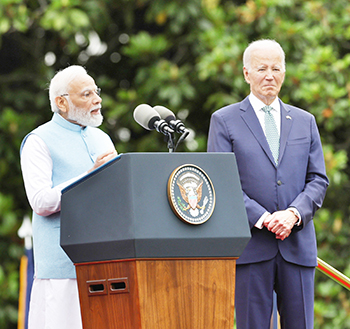 After their bilateral meeting, both leaders delivered remarks, and Mr. Modi answered questions from the press. He agreed with President Biden that democracy was inherent to India and the United States, asserting that it runs in their veins. Mr. Modi denied any discrimination in India when questioned about it. The leaders also discussed the situation in Ukraine, with Mr. Modi expressing India’s willingness to contribute to restoring peace.
After their bilateral meeting, both leaders delivered remarks, and Mr. Modi answered questions from the press. He agreed with President Biden that democracy was inherent to India and the United States, asserting that it runs in their veins. Mr. Modi denied any discrimination in India when questioned about it. The leaders also discussed the situation in Ukraine, with Mr. Modi expressing India’s willingness to contribute to restoring peace.
Earlier in the day, General Electric and Hindustan Aeronautical Limited announced a significant Memorandum of Understanding (MoU) for the co-production of GE 414 Jet Engines in India. The deal aimed to produce engines for the Tejas Mk2 light combat aircraft. U.S. officials highlighted their successful efforts in overcoming bureaucratic hurdles for this agreement. Additionally, India’s purchase of armed drones was expected to be announced. The Defense Ministries of both countries also launched an innovation platform called ‘INDUS-X’ to promote defense industrial collaboration. Several major announcements from the private sector accompanied the visit, including U.S. chip maker Micron Technology’s plan to invest in a chip assembly and test facility in Gujarat.
In the realm of space cooperation, India joined a framework of 25 countries for space exploration and collaboration. The two nations agreed on a framework for human spaceflight and planned a mission to the International Space Station in 2024.
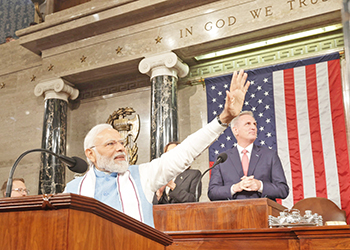 As for visa processes, the U.S. introduced a pilot program that allows certain petition-based temporary workers to renew their visas domestically, eliminating the need to travel abroad. The program may expand to cover skilled visas by 2024 and potentially other visa categories. Additionally, the U.S. announced the opening of two new consulates in Bengaluru and Ahmedabad, while India planned to reopen its consulate in Seattle and establish new consulates in other locations.
As for visa processes, the U.S. introduced a pilot program that allows certain petition-based temporary workers to renew their visas domestically, eliminating the need to travel abroad. The program may expand to cover skilled visas by 2024 and potentially other visa categories. Additionally, the U.S. announced the opening of two new consulates in Bengaluru and Ahmedabad, while India planned to reopen its consulate in Seattle and establish new consulates in other locations.
Indian Prime Minister Narendra Modi’s recent visit to the United States marked a significant milestone in the bilateral relationship between India and the U.S. This news article provides a comprehensive overview of Modi’s visit, highlighting key events, agreements, and the potential implications for both nations.
Strengthening Diplomatic Ties:
Prime Minister Modi’s visit began with a ceremonial welcome at the White House’s South Lawn, where he was received by President Biden and First Lady Jill Biden. The warm reception reflected the growing importance of the India-U.S. relationship and set the tone for the discussions that followed. The presence of cabinet officials from both countries and a large number of members from the Indian diaspora underscored the strong support and enthusiasm for closer ties.

Next Generation Partnership:
During their bilateral meeting, President Biden and Prime Minister Modi emphasized the significance of a “next generation partnership” between India and the U.S. This vision encompasses collaborations in defense, technology, health, energy, and mobility. The leaders announced a long list of deliverables and agreements in these areas, showcasing their commitment to expanding cooperation and harnessing the potential of both nations.
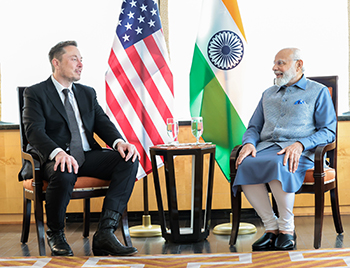 Defense and Security Cooperation:
Defense and Security Cooperation:
One of the key highlights of the visit was the defense and security cooperation between India and the U.S. The signing of agreements for the co-production of GE 414 Jet Engines for the Tejas Mk2 light combat aircraft by General Electric and Hindustan Aeronautical Limited was a major achievement. This collaboration not only strengthens India’s defense capabilities but also deepens the defense industry partnership between the two countries. The leaders also discussed the war in Ukraine, with Prime Minister Modi expressing India’s readiness to contribute to peace restoration efforts.
Technological Collaboration:
Both nations recognized the importance of technological collaboration to drive innovation and economic growth. The visit witnessed the launch of an innovation platform called ‘INDUS-X’ to foster defense industrial collaboration. This platform aims to encourage joint research and development projects, technology transfer, and joint manufacturing initiatives. Additionally, U.S. semiconductor technology and chip maker Micron Technology, Inc. announced a significant investment in a chip assembly and test facility in Gujarat. This investment signals the potential for expanding technological partnerships between India and the U.S., fostering innovation and boosting manufacturing capabilities.
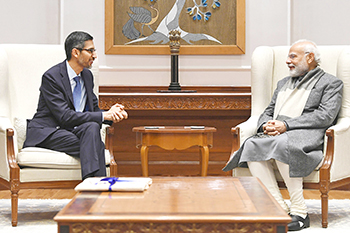 Economic Partnerships and Trade:
Economic Partnerships and Trade:
Prime Minister Modi’s visit provided an opportunity to explore avenues for enhancing economic partnerships and trade between India and the U.S. Discussions included topics such as investment, job creation, and boosting business ties. The reopening of India’s consulate in Seattle and the opening of new U.S. consulates in Bengaluru and Ahmedabad are expected to facilitate increased economic cooperation and people-to-people exchanges. These consulates will serve as hubs for fostering trade, promoting investments, and expanding cultural and educational exchanges between the two countries.
Addressing Democratic Norms and Human Rights Concerns:
The visit also shed light on concerns about democratic norms and human rights in India. Over 70 lawmakers in the U.S. wrote to President Biden, urging him to raise these issues during his discussions with Prime Minister Modi. Former President Barack Obama, a close ally of President Biden, also appealed to Mr. Modi to protect ethnic minorities in India. While these concerns were acknowledged, both leaders reiterated their commitment to democratic values and emphasized the power of diversity and inclusivity in their respective countries. The visit served as an opportunity for constructive dialogue on these important issues, highlighting the shared commitment to upholding democratic principles and protecting human rights. Both leaders acknowledged the importance of open and inclusive societies in fostering economic growth, innovation, and social development.
Climate Change and Environment:
Recognizing the urgent need to address climate change, Prime Minister Modi’s visit also placed a significant emphasis on environmental cooperation. The leaders discussed the importance of collaboration in tackling this global challenge and reaffirmed their commitment to achieving climate goals. India’s active participation in the framework for space exploration and cooperation, as well as plans for a joint mission to the International Space Station in 2024, demonstrates the commitment of both nations to advancing space technology for environmental research and monitoring. These initiatives provide a platform for joint efforts in developing sustainable practices, promoting renewable energy, and mitigating the impact of climate change.
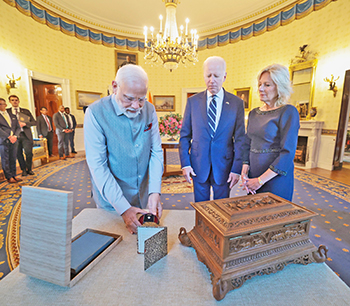 People-to-People Exchanges and Cultural Diplomacy:
People-to-People Exchanges and Cultural Diplomacy:
Prime Minister Modi’s visit provided an opportunity to strengthen people-to-people exchanges and cultural diplomacy between India and the U.S. The large presence of the Indian diaspora during the ceremonial welcome at the White House highlighted the vibrant Indian community in the United States. Their enthusiastic chants of “Modi, Modi” and “Vande mataram” resonated with the shared cultural heritage and values between the two nations. Such interactions serve as a bridge, fostering a deeper understanding and appreciation of each other’s cultures. The visit also witnessed engagements with prominent Indian-American figures from various fields, promoting collaboration in academia, business, and innovation.
Visa Processes and Consular Services:
The visit addressed important practical aspects of the India-U.S. relationship, including visa processes and consular services. The announcement of a pilot program to renew visas domestically for certain petition-based temporary workers was well-received. This initiative eliminates the need to travel outside the country for visa renewal, providing convenience and efficiency for individuals seeking to work in the U.S. Both countries also announced plans for the opening of new consulates, reflecting the commitment to facilitating smoother diplomatic services and fostering closer ties. The opening of consulates in Bengaluru and Ahmedabad in India, along with the reopening of India’s consulate in Seattle, will further enhance consular support and facilitate stronger people-to-people exchanges.
Media Interaction and Public Perception:
Prime Minister Modi’s two-way press interaction during the visit was notable. It allowed for direct engagement with both American and Indian press corps, enabling open discussions on a range of topics, including democracy in India and climate change. Such interactions provide transparency and offer insights into the perspectives of both leaders. They also play a crucial role in shaping public perception and understanding of the visit’s outcomes, fostering a sense of trust and cooperation between the two nations.
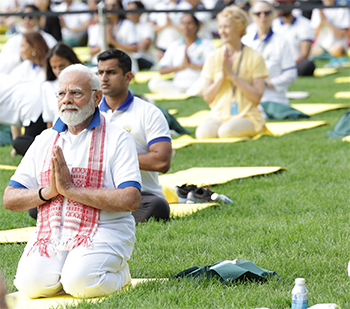 Strategic Indo-Pacific Cooperation:
Strategic Indo-Pacific Cooperation:
Prime Minister Modi’s visit to the United States further solidified the strategic cooperation between India and the U.S. in the Indo-Pacific region. Both leaders reaffirmed their commitment to upholding a free, open, inclusive, and rules-based Indo-Pacific. The discussions emphasized the importance of maritime security, freedom of navigation, and respect for international law. The visit provided an opportunity to explore joint exercises, information sharing, and capacity-building initiatives to enhance regional stability and ensure a peaceful and prosperous Indo-Pacific.
Counterterrorism Cooperation:
The leaders also discussed counterterrorism efforts and emphasized the need for closer collaboration in combating global terrorism. India and the United States recognized the shared threat posed by extremist groups and reaffirmed their commitment to strengthening intelligence sharing, disrupting terrorist networks, and preventing the financing of terrorism. The visit highlighted the mutual commitment to safeguarding national security and promoting global peace and stability.
Education and Research Collaboration:
Education and research collaboration were key areas of focus during the visit. Recognizing the importance of academic exchanges and knowledge-sharing, both nations emphasized the need to strengthen educational ties. This includes promoting student exchanges, facilitating research partnerships, and enhancing collaboration between universities and research institutions. Such initiatives aim to foster innovation, intellectual growth, and cultural understanding between the two countries.
Healthcare Cooperation:
The COVID-19 pandemic brought to the forefront the importance of global healthcare cooperation. Prime Minister Modi’s visit provided an opportunity to discuss collaborations in the healthcare sector. The leaders emphasized the importance of vaccine production, distribution, and equitable access to vaccines. The discussions also focused on strengthening healthcare infrastructure, promoting research and development, and sharing best practices in public health. These initiatives aim to enhance resilience in the face of future health crises and foster global health security.
Diaspora Engagement:
Prime Minister Modi’s visit highlighted the significant role of the Indian diaspora in strengthening the India-U.S. relationship. The presence of a large number of diaspora members during the visit showcased their commitment and support for closer ties between the two nations. The visit provided a platform for engaging with the diaspora, recognizing their contributions in various fields, and fostering a sense of belonging and connection. Diaspora engagement initiatives aim to harness the potential of Indian-Americans and promote greater cultural exchange, economic cooperation, and people-to-people ties.
Follow-up Actions and Future Prospects:
Prime Minister Modi’s visit to the United States set the stage for follow-up actions and further deepening of the bilateral relationship. The agreements and initiatives announced during the visit will be implemented in the coming months, facilitating closer cooperation in defense, technology, trade, climate change, and various other areas. The visit laid the foundation for a stronger, more comprehensive partnership between India and the United States, with opportunities for continued dialogue, collaboration, and mutual benefit. As both countries look ahead, the prospects for enhanced strategic, economic, and cultural cooperation appear promising.
Prime Minister Narendra Modi’s visit to the United States marked an important chapter in the India-U.S. relationship. The meetings, agreements, and announcements during the visit underscored the growing strategic partnership, highlighting shared values, common interests, and areas of collaboration. From defense and technology to trade and climate change, the discussions and initiatives undertaken aim to strengthen bilateral ties and explore new opportunities for cooperation. The visit also addressed concerns related to democratic norms and human rights, emphasizing the importance of upholding inclusive principles. As India and the United States move forward, the outcomes of this visit have the potential to shape not only the bilateral relationship but also contribute to regional and global stability, prosperity, and sustainability. With a renewed commitment to mutual cooperation and understanding, India and the United States stand poised to build a stronger, more resilient partnership in the years to come.

